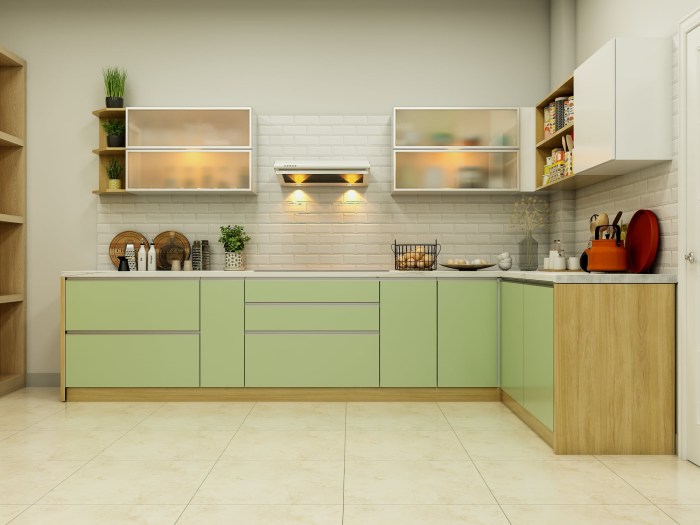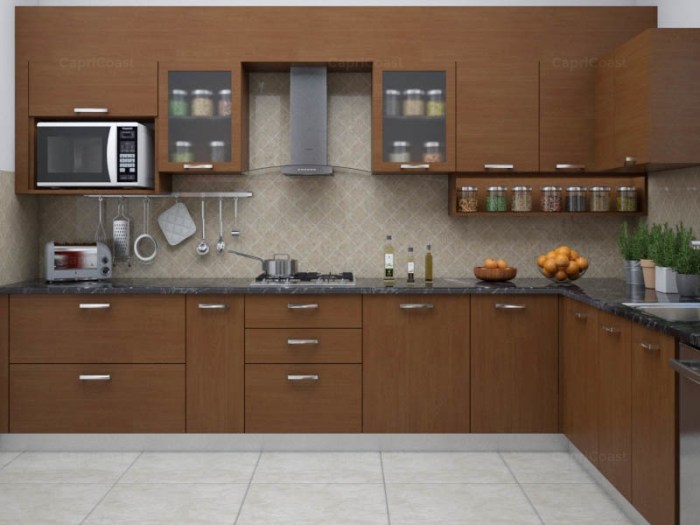Tips for Designing a Modular Kitchen That’s Eco-Conscious takes readers on an exciting journey into the realm of sustainable kitchen design. This comprehensive guide unveils innovative strategies and eco-friendly materials that transform kitchens into havens of both style and environmental responsibility.
From energy-efficient appliances to waste reduction strategies, this narrative delves into the intricacies of creating a modular kitchen that seamlessly blends functionality with environmental consciousness. Prepare to be inspired as we explore the possibilities of sustainable kitchen design.
Sustainable Material Selection: Tips For Designing A Modular Kitchen That’s Eco-Conscious
Incorporating eco-friendly materials is paramount for designing an eco-conscious modular kitchen. Sustainable materials not only reduce environmental impact but also enhance durability and longevity.
Bamboo
Bamboo is a rapidly renewable resource with exceptional strength and durability. It releases more oxygen and absorbs more carbon dioxide than trees, making it a sustainable choice. Bamboo countertops, cabinets, and flooring are gaining popularity due to their resilience and aesthetic appeal.
Reclaimed Wood
Reclaimed wood is sourced from old structures or salvaged materials, reducing waste and preserving natural resources. It adds character and warmth to the kitchen while minimizing environmental impact. Reclaimed wood can be used for countertops, cabinetry, and flooring.
Low-VOC Finishes, Tips for Designing a Modular Kitchen That’s Eco-Conscious
Volatile organic compounds (VOCs) are harmful chemicals released from paints, finishes, and adhesives. Choosing low-VOC finishes helps maintain indoor air quality and reduces the emission of harmful substances into the environment. Water-based finishes, natural oils, and zero-VOC paints are excellent options.
Energy-Efficient Appliances
When designing an eco-conscious modular kitchen, energy-efficient appliances play a crucial role. They not only reduce energy consumption, but also minimize environmental impact and lower utility bills.
Energy-saving features to look for in appliances include:
- Refrigerators:Energy Star-rated refrigerators use up to 40% less energy than conventional models. Features like frost-free operation, adjustable temperature settings, and efficient compressors contribute to energy savings.
- Dishwashers:Look for Energy Star-certified dishwashers that use less water and energy. They often feature water-saving cycles, soil sensors, and energy-efficient drying systems.
- Ovens:Energy-efficient ovens use less energy to heat food. Consider models with convection fans, which circulate hot air for faster and more even cooking, reducing cooking time and energy consumption.
Comparing energy consumption between different appliance models is essential. Look for the Energy Star label or check manufacturer specifications for annual energy consumption estimates. Energy-efficient appliances may have a higher upfront cost, but they offer significant long-term savings on energy bills and contribute to a more sustainable kitchen.
Natural Lighting and Ventilation
Natural light and ventilation play a crucial role in creating an eco-conscious modular kitchen. By incorporating passive design strategies, you can reduce energy consumption and improve the overall indoor environment.Maximizing natural light through windows and skylights reduces the need for artificial lighting during the day.
This not only saves energy but also improves your mood and productivity. Cross-ventilation, the flow of air through opposite openings, helps maintain air quality and regulate temperature, reducing the need for mechanical ventilation.
Passive Design Strategies
* Position windows and skylights strategically to capture maximum sunlight.
- Use light-colored materials for walls and cabinetry to reflect and distribute light.
- Incorporate operable windows and doors to allow for cross-ventilation.
- Consider installing a clerestory window to draw hot air upwards and promote natural ventilation.
Waste Reduction Strategies

Minimizing waste is crucial for an eco-conscious modular kitchen. Here are some effective strategies to reduce waste during meal preparation and cleanup:
Composting and Recycling
- Set up compost bins for organic waste, such as fruit and vegetable scraps, coffee grounds, and tea bags.
- Establish a recycling system for materials like plastic, glass, and paper, following local recycling guidelines.
Reusable Containers
- Replace single-use plastic containers with reusable ones made from glass, stainless steel, or bamboo.
- Use reusable bags for grocery shopping and lunch packing.
Minimizing Food Waste
- Plan meals and create shopping lists to avoid impulse purchases and overstocking.
- Store food properly to extend its shelf life.
- Use leftovers creatively to create new dishes.
- Donate excess food to local food banks or shelters.
Sustainable Storage Solutions
Optimizing storage spaces is paramount for resource conservation. Vertical space utilization, modular shelves, and drawer organizers facilitate efficient item placement, reducing clutter and unnecessary space consumption.
Eco-Friendly Storage Containers
- Choose reusable containers made from sustainable materials like bamboo, glass, or recycled plastic.
- Opt for containers with airtight seals to preserve food freshness and minimize waste.
Sustainable Storage Materials
- Use shelves and drawers crafted from certified sustainable wood or bamboo.
- Consider reclaimed wood or repurposed materials for a unique and eco-friendly aesthetic.
Final Summary

In conclusion, designing a modular kitchen that’s eco-conscious is not merely a trend but a necessity for the environmentally conscious homeowner. By embracing sustainable materials, energy-efficient appliances, natural lighting, waste reduction strategies, and innovative storage solutions, you can create a kitchen that not only meets your culinary needs but also aligns with your values of environmental stewardship.
Let this guide be your compass as you embark on this rewarding journey of sustainable kitchen design.
Questions Often Asked
What are the key benefits of using sustainable materials in kitchen design?
Sustainable materials offer numerous benefits, including reduced environmental impact, improved indoor air quality, and enhanced durability. They contribute to a healthier living space while minimizing your carbon footprint.
How can I incorporate energy-efficient appliances into my modular kitchen?
Look for appliances with Energy Star ratings, which indicate their compliance with strict energy efficiency standards. These appliances consume less energy, reducing your utility bills and environmental impact.
What are some practical waste reduction strategies for a modular kitchen?
Implement composting systems for organic waste, utilize reusable containers instead of single-use plastics, and optimize storage spaces to minimize food spoilage. These strategies effectively reduce waste and promote resource conservation.
